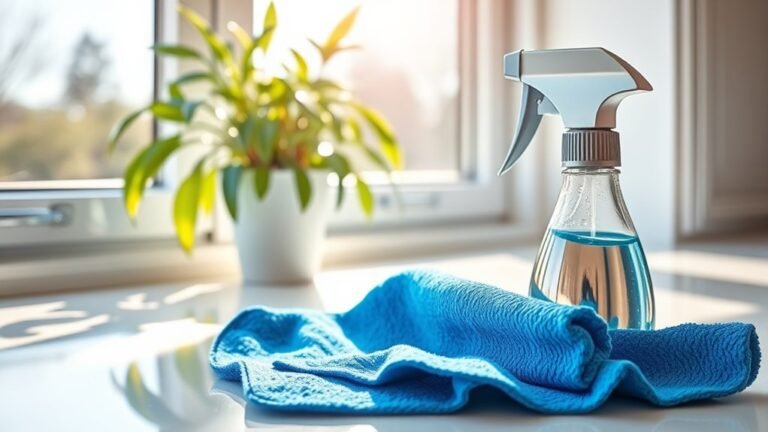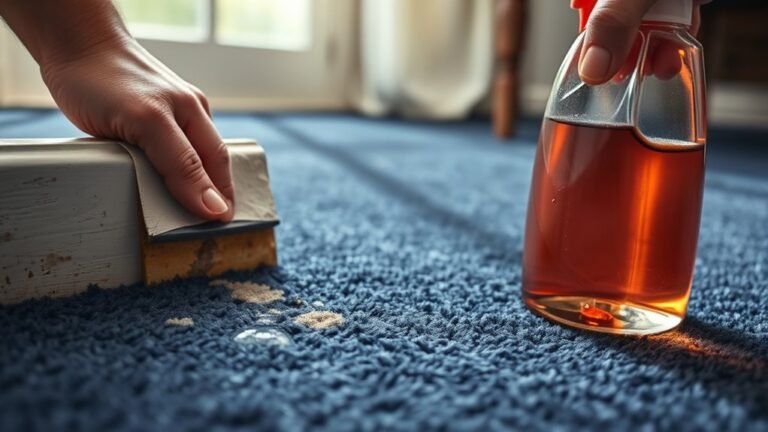Natural Cleaning Hacks for Your Grease
You can easily tackle grease with natural ingredients you likely have at home. Try mixing equal parts vinegar and water to spray and wipe away grime or sprinkle baking soda to scrub stubborn spots. Lemon juice breaks down stains, while salt works as a gentle abrasive. Cornstarch absorbs excess grease, and Castile soap offers a gentle, effective clean. Adding essential oils can boost freshness and antibacterial power. Keep exploring for more simple, effective grease-fighting tips.
Using Vinegar to Cut Through Grease

Vinegar is a powerful natural cleaner that can easily cut through grease buildup in your kitchen. When you embrace vinegar benefits, you’re choosing a non-toxic, eco-friendly solution that liberates you from harsh chemicals. Its acidity breaks down stubborn grease, making cleanup quick and effective. For vinegar application, simply mix equal parts white vinegar and water in a spray bottle. Spray the solution directly onto greasy surfaces like stovetops, countertops, or backsplashes. Let it sit for a few minutes, then wipe away with a clean cloth. This method not only saves you money but also gives you control over what’s in your home. Using vinegar, you’re freeing yourself from commercial cleaners and embracing a simple, natural way to keep your kitchen spotless.
Baking Soda as a Natural Degreaser
Although grease can be tough to tackle, baking soda offers a simple and effective way to break it down naturally. You can rely on baking soda applications to free your surfaces from stubborn grease without harsh chemicals. For instance, sprinkle baking soda directly on greasy spots, let it sit for a few minutes, then scrub away with a damp cloth. Baking soda mixtures, like combining it with water to form a paste, boost its degreasing power. This paste can target grease on stovetops, countertops, or even inside ovens. The best part? Baking soda is safe, affordable, and environmentally friendly, giving you the freedom to clean confidently while protecting your home. Embrace baking soda as your go-to natural degreaser and enjoy effortless grease removal.
Lemon Juice for Tackling Grease Stains

When you’re dealing with grease stains, lemon juice can be a powerful natural solution. Its acidity breaks down tough grease, making it easier to remove without harsh chemicals. Here’s how you can use lemon juice to free your surfaces from grease stains:
- Squeeze fresh lemon juice directly onto the grease stains.
- Let it sit for about 10 minutes to allow the acid to work.
- Scrub gently with a soft brush or cloth to lift the grease.
- Rinse with warm water and wipe dry.
Using lemon juice not only tackles grease stains effectively but also leaves a fresh, natural scent. It’s a simple, eco-friendly hack that lets you clean freely and confidently.
Salt and Its Abrasive Cleaning Power
A simple pinch of salt can make a big difference in your cleaning routine. Salt’s natural abrasive materials allow you to scrub away stubborn grease without harsh chemicals. You get the salt benefits of lifting grime and breaking down oily residues, all while keeping your space toxin-free. Using salt is an easy way to reclaim control over your environment, giving you freedom from synthetic cleaners. Just sprinkle salt on greasy spots, then scrub gently with a damp cloth or sponge. It’s tough on grease but gentle on your surfaces. Embracing salt’s abrasive power means you’re choosing a natural, effective method that fits your lifestyle—clean, simple, and free. Let salt be your go-to ally when tackling grease naturally.
Olive Oil and Salt for Polishing Greasy Surfaces

You’ll love how olive oil naturally nourishes and shines greasy surfaces without harsh chemicals. When combined with salt, its gentle abrasive power helps lift grime and polish your items effortlessly. Let’s explore how this simple duo can refresh your kitchen and beyond.
Benefits of Olive Oil
Although olive oil is often praised for its culinary uses, it’s also a powerful natural cleaner, especially when combined with salt. Using olive oil for polishing greasy surfaces offers you a simple, effective way to harness its benefits beyond the kitchen. Here’s why you should consider it:
- Natural Shine: Olive oil restores the luster of wood and metal without harsh chemicals.
- Moisturizing Effect: It nourishes wooden surfaces, preventing cracks and extending their life.
- Non-Toxic: You avoid exposure to synthetic cleaners, promoting a healthier home environment.
- Health Benefits: The antioxidants in olive oil can subtly contribute to your well-being even through cleaning.
Embrace olive oil’s versatility and enjoy a cleaner space with freedom from harmful substances.
Salt’s Abrasive Power
When combined with olive oil, salt becomes an effective abrasive that tackles grease and grime without scratching surfaces. You can harness salt’s abrasive power through simple salt scrubbing techniques that give you control over tough, greasy messes. Mix coarse salt with olive oil to create a natural polish that lifts stubborn grease while conditioning surfaces. This blend not only cleans but also adds a subtle shine, freeing you from harsh chemicals. Experiment with salt cleaning recipes by adjusting salt coarseness and oil amounts to suit different surfaces, from metal pans to wooden countertops. Embracing these methods lets you reclaim your space with ease, maintaining freedom from toxic cleaners while keeping your home spotless and naturally fresh.
Cornstarch for Absorbing Excess Grease
A simple spoonful of cornstarch can quickly soak up excess grease from fabrics, countertops, or even cookware. Its natural grease absorption makes cornstarch application a go-to for easy, chemical-free cleaning. Here’s how you can use it:
- Sprinkle cornstarch directly onto the greasy spot.
- Let it sit for 10-15 minutes to absorb the oil.
- Gently brush or vacuum away the powder.
- For fabrics, launder as usual afterward.
This method gives you freedom from harsh cleaners while effectively lifting grease. Whether it’s a cooking spill or a stubborn stain, cornstarch’s gentle, natural properties help you reclaim your space without restrictions. You’ll appreciate how simple and effective this little pantry staple is for your natural cleaning routine.
Castile Soap for Gentle Yet Effective Degreasing
You might want to try Castile soap, a plant-based cleaner known for its gentle yet effective degreasing power. It works by breaking down oils without harsh chemicals, making it safe for various surfaces. Just be sure to use it properly to avoid any residue or skin irritation.
What Is Castile Soap?
Castile soap stands out as a versatile and eco-friendly cleaning option that you might not have tried yet. Made from pure plant oils like olive oil, it’s biodegradable and gentle on your skin and surfaces. You’ll love the castile soap benefits, especially its natural ingredients and multi-purpose use. Plus, it’s easy to customize with various castile soap recipes for cleaning, personal care, or even pet care.
Here are four reasons to give it a shot:
- Totally free from synthetic detergents and harsh chemicals.
- Perfect for tackling grease without damaging your surfaces.
- Can be diluted for different cleaning needs, saving you money.
- Safe for your family, pets, and the planet, giving you true freedom in your cleaning choices.
How Castile Soap Works
Although it may seem gentle, this soap packs a powerful punch when it comes to cutting through grease and grime. Castile soap works by breaking down oily residues with its plant-based surfactants, allowing you to rinse away dirt effortlessly. One of the biggest castile soap benefits is its versatility—you can create various castile soap recipes tailored for different cleaning needs, from kitchen counters to greasy pans. Using it liberates you from harsh chemicals, giving you a natural yet effective way to tackle tough messes. When you choose castile soap, you’re embracing freedom: freedom from toxins, synthetic fragrances, and the struggle of stubborn grease. It’s a smart, eco-friendly ally that makes cleaning simpler and safer without compromising on power.
Using Castile Soap Safely
When tackling grease with natural solutions, it’s important to know how to use castile soap safely to get the best results without damaging surfaces or irritating skin. Castile soap benefits extend beyond cleaning; it’s gentle yet effective for various castile soap uses around your home. Here’s how to use it wisely:
- Dilute properly—mix with water to avoid residue or surface damage.
- Test on a small area first to guarantee compatibility with delicate surfaces.
- Wear gloves if you have sensitive skin to prevent irritation.
- Rinse thoroughly after cleaning to remove any soap traces and keep surfaces fresh.
Essential Oils to Boost Cleaning Power and Freshness
If you want to elevate your cleaning routine, adding essential oils is a simple way to boost both power and freshness. You can create your own essential oil blends tailored to your preferences, combining oils like lemon, tea tree, and eucalyptus for their natural grease-cutting and antibacterial properties. These blends not only enhance cleaning effectiveness but also fill your space with uplifting scents, making aromatic cleaning a delight rather than a chore. Just add a few drops to your homemade cleaner or spray bottle, and you’ll notice how quickly grime disappears while your home smells fresh and inviting. Embracing essential oils gives you freedom from harsh chemicals and lets you customize your cleaning experience to suit your lifestyle perfectly.
Frequently Asked Questions
Can These Natural Cleaners Be Used on All Types of Kitchen Surfaces?
You’ll want to check surface compatibility before using any cleaner, especially natural ones, to avoid damage. Some materials have sensitivity to acidic or abrasive ingredients, so it’s smart to test on a small spot first. While natural cleaners often give you freedom from harsh chemicals, they’re not one-size-fits-all. By understanding your kitchen surfaces and their sensitivities, you can confidently keep your space clean without worry.
Are Natural Degreasers Safe for Septic Systems?
You’ll be glad to know natural degreasers are generally safe for septic systems because they use eco friendly options that support septic health. Unlike harsh chemicals, these natural cleaners break down without disrupting the beneficial bacteria in your system. So, if you want to keep your septic tank functioning freely and avoid costly repairs, sticking with natural degreasers is a smart, responsible choice that aligns with your desire for freedom and sustainability.
How Do Natural Cleaning Hacks Compare to Commercial Degreasers?
Think of natural cleaning hacks as a gentle breeze compared to the storm of commercial degreasers. When you look at effectiveness comparison, commercial products often act faster and stronger, but natural options still do a solid job without harsh chemicals. Ingredient safety is a big win for natural hacks—they’re kinder to you, your home, and the environment. So, if freedom from toxins matters, natural methods let you clean with peace of mind.
Can These Methods Remove Old, Stubborn Grease Stains?
When you’re tackling old grease and stubborn stains, you might find that natural methods can surprise you. They often work well if you’re patient and persistent, letting ingredients like baking soda or vinegar sit and break down the grime. While they may not always match the instant power of commercial products, these natural options give you freedom from harsh chemicals and still get the job done with a bit of elbow grease.
Are There Any Precautions When Mixing These Natural Ingredients?
When mixing natural ingredients, you’ve got to keep safety measures in mind to avoid any unwanted reactions. Always check ingredient compatibility before combining them—you don’t want to create fumes or reduce effectiveness. For example, mixing vinegar with baking soda is safe but combining vinegar with bleach isn’t. Trust your instincts, keep your space well-ventilated, and don’t hesitate to test small batches first. That way, you can clean freely without worrying about harmful surprises.






